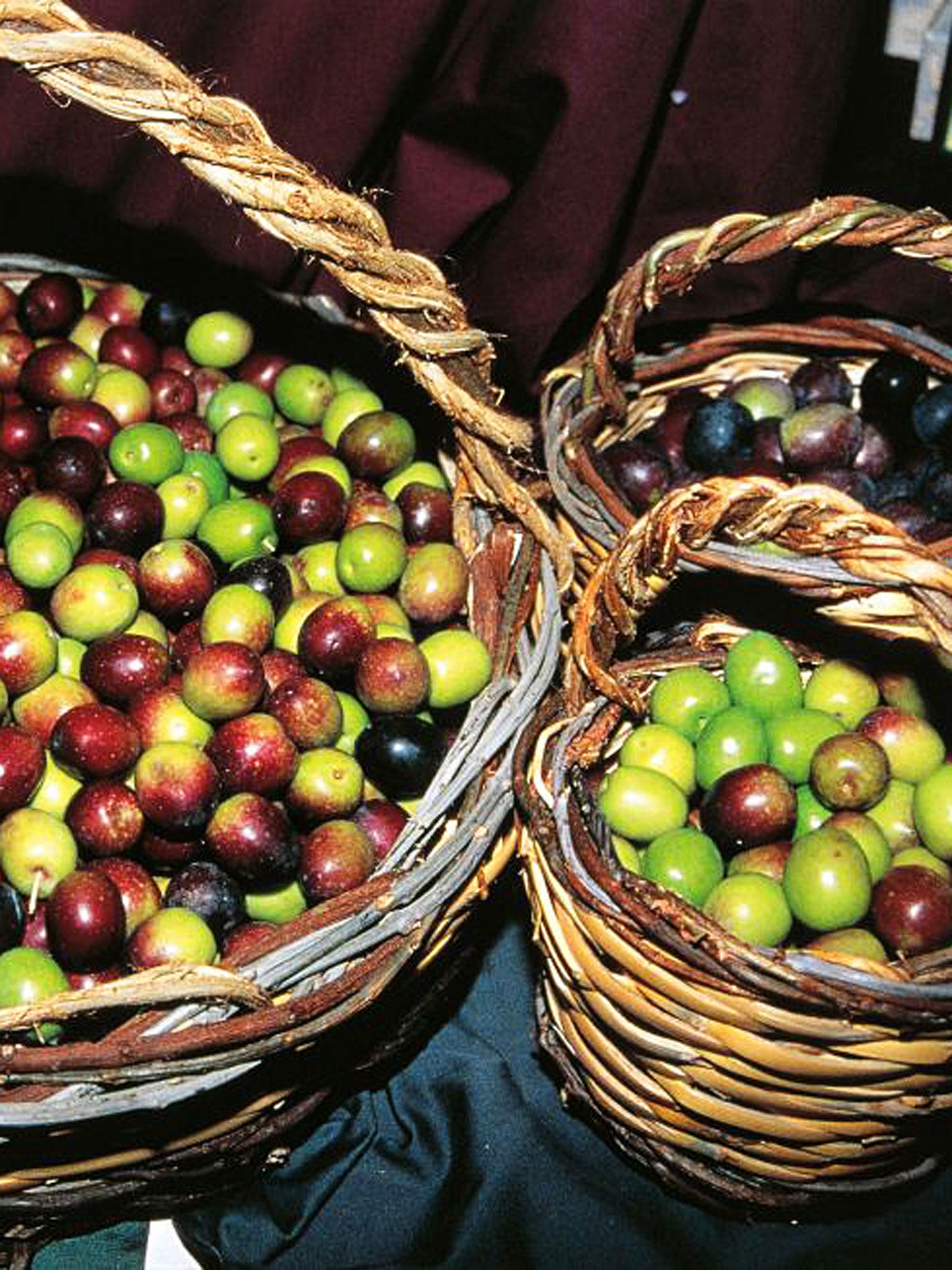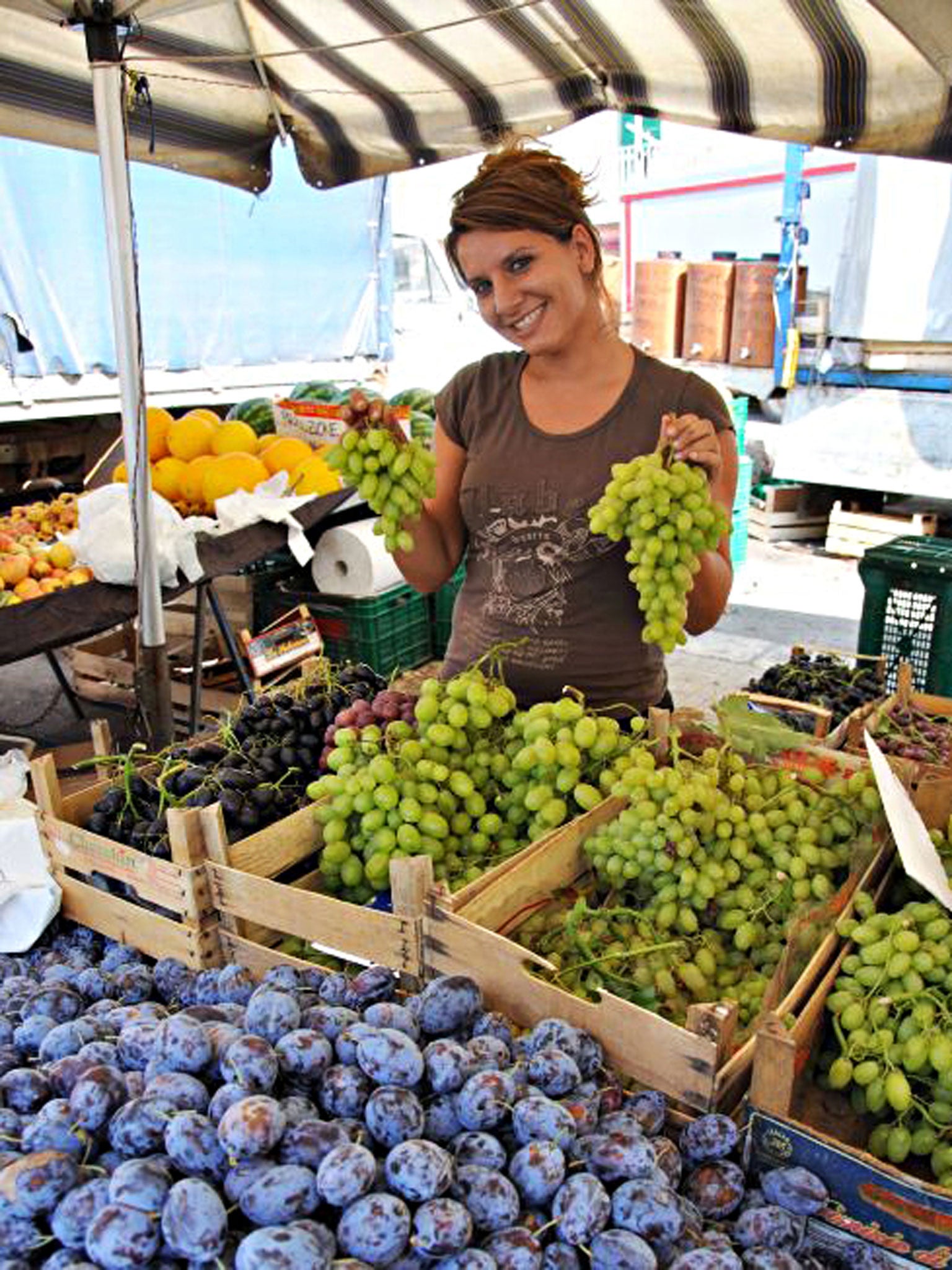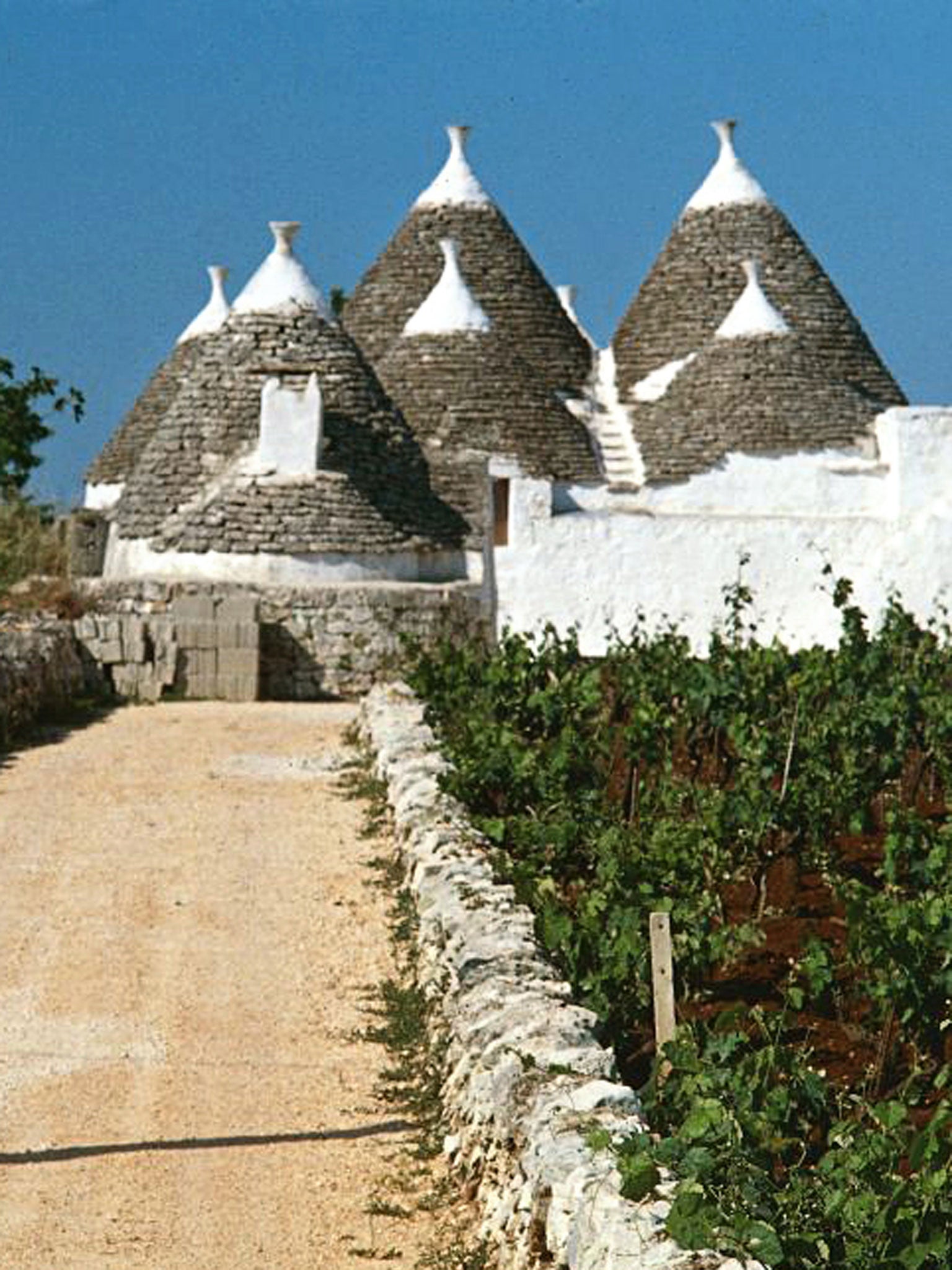The Independent's journalism is supported by our readers. When you purchase through links on our site, we may earn commission.
Puglia: The true taste of Italy
Puglia produces more olive oil than anywhere else in the country. Duncan Garwood heads south to explore a region of fine flavours and unique architecture

"Wild chicory," says Stefano, pointing to what looks like a weed at the bottom of a crumbling dry-stone wall. "You boil it, pass it in olive oil and serve with a purée of fava beans."
I am in the countryside outside the small town of Putignano in Puglia and Stefano D'Onghia, a local chef, is showing me his vegetable garden. As he talks, he touches the budding red peppers, plump aubergines and chicory leaves, before deciding on turnip tops (cime di rapa) for lunch.
The judicious use of humble greens has long been a hallmark of Pugliese cooking. It's a joy to see Stefano bring them to life at the stove of his restaurant, Osteria A 'Cr' Janz in Putignano. After tossing them in extra-virgin olive oil and chilli, he mixes in some orecchiette (ear-shaped pasta) and serves with a sprinkling of fried breadcrumbs.
Puglia, the region that runs down Italy's heel, is a gourmet's dream. Its cuisine, a kind of blueprint for the classic Mediterranean diet, is rooted in cucina povera (peasant cookery) and based on simple staples such as vegetables, seafood, pasta and olive oil. All local, of course. Puglia is one of Italy's most fertile regions and produces more than 40 per cent of the country's olive oil as well as much of its grain and vast quantities of wine.

For a full immersion in its culinary treasures, I joined a tasting tour of the Valle d'Itria, an area of olive groves and whitewashed towns about an hour's drive south-east of Bari.
A tangled knot of claustrophobic alleyways, courtyards and butter-white basilicas, Bari's historic centre is not the obvious place to start a foodie trip. But it's here that we get our first glimpse of traditional pasta-making methods.
On a back lane near the Basilica di San Nicola, we meet Rosa, a cheerful old girl who spends much of her day doing little else but hand-rolling orecchiette. As tradition dictates, she uses only semolina and water to make the dough and nothing more high-tech than a knife to shape the pasta shells. When we pass by, she has finished for the day and every inch of her tunnel-shaped kitchen is crammed with trays of drying pasta ears.
Next morning, we leave Bari and strike out towards the Valle d'Itria. As we move inland, the landscape becomes increasingly rural and we are soon driving past grey dry-stone walls, rolling grain fields and orchards of cherry and almond trees. We also get our first sighting of the Valle's unique conical-capped trulli houses.
Our first stop is Putignano, about 25 miles from Bari. This workaday agricultural town is best known for its extravagant carnival celebrations, said to be the oldest in Europe, but we're here for the food. So, joined by Stefano and local food writer Francesco Biasi, we head to the local cheesemaker, Sapori delle Masserie for a masterclass in making mozzarella.
Mozzarella has been produced in this part of Puglia for centuries and is still a prized local speciality. To make it, fresh cow's milk is poured on to a starter whey of mozzarella from the day before and gently warmed. After a couple of hours, water, heated to 90C, is added and the curd is stirred until it is soft and malleable. It's then tied into balls, plaits (trecce) or knots (nodini), and plunged into iced water to firm up. The final product has a delicious, delicate, slightly salty taste.

A short drive west of Putignano, Gioia del Colle has a long tradition of wine-making. Historically, Pugliese wine has been short on style and long on alcohol. "Before, we used to send our strong, sugary grapes north to blend with more aromatic varieties from northern Italy and France," explains Dionisio, our aptly named guide. However, recent years have seen a renaissance, and the region's wines are being taken seriously by aficionados across the world. To taste for ourselves, we make for Cantine Polvanera, an organic winery with extensive vineyards planted in the karst landscape.
Run by Filippo Cassano and his family since 2005, the estate produces a full range of white and rosé wines. But the real stars are the smooth, full-bodied primitivos – fermented for two years in steel containers before being bottled and aged for a further year. For a sip, we retire to Filippo's charming masseria and sit down to a sumptuous farmhouse spread: sweet capocollo ham, globes of creamy burrata, crispy taralli (bread rings) and bruschetta drizzled with extra-virgin olive oil.
Olive oil is the nearest thing Puglia has to liquid gold. The region produces more oil than any other in Italy and its ancient landscape is carpeted by 66 million olive trees. Many of these are centuries old, some even thousands of years old. As we drive up to Alberobello we pass some ancient specimens. Their gnarled, twisted trunks and massive roots give them a primeval look, like something out of a Tolkien epic.
Alberobello is Puglia's trulli capital. It's a bizarre looking place and as we wander its sloping streets I can't help but feel I'm in a kind of weird, historical theme park. But the 1,000-odd trulli are real enough. These stone huts were built with conical roofs to keep them cool in summer and warm in winter, and originally without cement. This allowed their wily owners to dismantle them when tax collectors were in the area and re-assemble them once the coast was clear.
In the outskirts of town, Oleificio Intini is an award-winning olive-oil producer. Like many in the area, it produces its own line of oils as well as serving as a community mill and pressing olives brought in by locals.
Pugliese oils are full-on and surprisingly spicy. After a sip of Intini's cold-pressed Picholine variety, I find myself fighting back a cough as its prickly aftertaste kicks in at the back of my throat. But this is normal, a good sign even. "A high spiciness means a high percentage of polyphenols," explains manager Pietro Intini, and it's these antioxidants that give the oil its many beneficial qualities.
Strangely, colour is no sign of quality. "You can get fantastic olive oil that's yellow or green. It all depends on the olives."
Suitably oiled, we push on to Martina Franca. This graceful historic town with a charming Baroque centre is home to capocollo, a cured ham much loved by Tony Soprano. Made from neck meat washed in wine and smoked over Macedonian oak wood, it's lovely sliced, or even better rolled into a ball and stuffed with cheese. We try one of these bombette (small bombs) grilled over hot coals at Raimondello, a busy butcher's in the eastern side of town. It's the perfect way to go out with a bang.
Travel essentials
Getting there
Bari is served by British Airways (0844 493 0787; ba.com) and easyJet (0843 104 5000; easyjet.com) from Gatwick, and by Ryanair (0871 246 0000; ryanair.com) from Stansted. Ryanair also flies from Stansted to Brindisi.
Inghams (01483 345 810; inghamsitaly.co.uk) offers a range of independent and group holidays in Puglia.
Staying there
Duncan Garwood stayed at the Hotel Oriente, Bari (00 39 080 5255100; hotelorientebari.it). Doubles start at €117, B&B.
Eating and drinking there
A 'Cr' Janz, Putignano (00 39 080 40 55 745; www.acrianzputignano.com).
Sapori delle Masserie, Putignano (00 39 080 49 12 237; saporidellemasserie.it).
Cantine Polvanera, Gioia del Colle (00 39 080 75 89 00; cantinepolvanera.it).
Oleificio Intini, Alberobello (00 39 080 43 25 983; oliointini.it).
Raimondello. Martina Franca (00 39 080 48 57 875; raimondello.com).
More information
Join our commenting forum
Join thought-provoking conversations, follow other Independent readers and see their replies
Comments